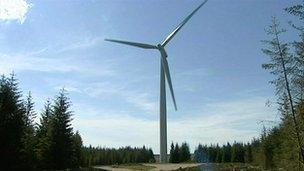Renewables industry says projects displacing CO2 emissions
- Published

The industry says wind and hydro projects have displaced 8.36 million tonnes of CO2 emissions
The renewable energy industry has published figures which, it claims, show Scotland is producing enough low carbon electricity to offset emissions from Longannet power station in Fife.
Scottish Renewables said 15% of the country's total carbon emissions have been displaced by renewables projects.
The figures have been welcomed by the Scottish government.
But anti-wind farm campaigners have long disputed claims that wind turbines help reduce carbon emissions.
The renewable energy sector said the latest figures show wind and hydro developments have displaced 8.36 million tonnes of CO2 emissions.
Supporters of renewable energy said that was the equivalent of taking some 3.5 million cars off the roads or turning off the country's biggest coal-fired power station.
Joss Blamire, of Scottish Renewables, said: "This is proof that Scotland's renewables industry is establishing itself as one of the most effective weapons in tackling climate change and addressing the greatest threat to our natural environment.
"Renewable electricity produced in Scotland by technologies such as wind and hydro already amounts to over one third of the total used in all of our homes and businesses, and these latest figures are evidence that we are delivering further real benefits."
Maximising opportunities
Dr Richard Dixon, director of WWF Scotland, said the industry was making "a huge difference" to Scotland's climate change emissions.
"This is a very significant contribution to reducing Scotland overall emissions and gives the lie to those who claim that renewables do not make a real difference," he said.
"This is such a huge amount of CO2 that it is equivalent to turning off a whole coal-fired power station."
Helen McDade, from conservation charity the John Muir Trust, said the figures did not show the full picture.
She told BBC Radio Scotland: "Unfortunately these figures don't give a true picture and the reason for that is this is the equivalent of a company publishing its annual accounts with gross profit and not putting in the net profit.
"What you have to take into account here is all the carbon in, if we take wind, making turbines, the extra transmission for that particular technology and particularly the back-up generation that we are going to have to build for the future."
Minister for Environment and Climate Change Paul Wheelhouse welcomed the figures.
He added: "The Scottish government is committed to maximising opportunities from the transition to a low carbon economy.
"Strong business, Scottish government and household investment in action such as developing renewables and improving energy efficiency is helping to place Scotland in an advantageous position on the global stage and ensuring that the benefits of this change are shared across the economy and in all our communities."
- Published10 October 2012
- Published13 September 2012
- Published10 August 2012
- Published11 November 2011
- Published11 November 2011